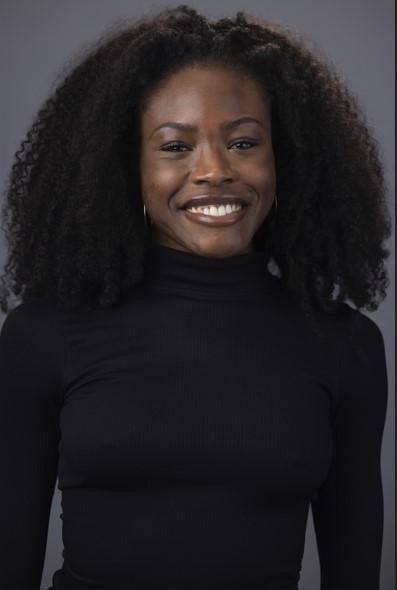Tricia Lee is a Real Estate Broker at Serhant Real Estate and one of the stars of the Netflix reality show, Owning Manhattan. Coined as the “honorary mayor of Brooklyn,” Tricia made a name for herself in the borough when she owned and operated her chain of nail and beauty bars, Polish Bar Brooklyn, for over 10 years in Fort Greene/Clinton Hill and Prospect Heights. Through her business, she built a vast network of folks in Brooklyn and used her network to propel her real estate career. She hit record-breaking sales in her first year of real estate, has made over $300M in sales, and has many accolades in her career, including Compass Real Estate’s 2016 Rookie of the Year and Top 5 Black Brokers in Brooklyn in 2024. Ryan Serhant recruited Tricia to work at his brokerage in 2021, where she runs Team Tricia Lee alongside her partner, Jeffrey St. Arromand.
Her Agenda spoke with Tricia to discuss the positive life changes she’s experienced since Owning Manhattan aired, how she continues to lead with beauty as she runs her real estate business, and how her confidence and drive help her fulfill her desire for the best.
[Editor’s note: This interview was originally published in July 2024. We are republishing it in honor of Season 2 of Owning Manhattan.]
Her Agenda: You’re one of the star cast members of Owning Manhattan [and] the show is out for the world to see on Netflix. How has life changed for you since the airing of the show?
Tricia Lee: It’s changed in a lot of ways. There’s a massive influx of [pleasant] communication coming in. I was running eight minutes late for this interview because I couldn’t get out of my class because my class members were like, ‘Oh, I want to see more of you.’ It’s definitely a lot of really positive feedback, and that’s beautiful. I did this for great business opportunities and great exposure for my brand. I feel like I’ve achieved that [and] it’s been great. [But] then it’s really beautiful because in a lot of ways nothing has changed and nothing is really different because I get to live in this really anonymous neighborhood and in this crazy world of New York where everybody’s doing something amazing, something hard, or something interesting. I wanted to do something effective to help propel my career and to help put another real image of Black women out for the world to see. I feel like I was able to do that, but I still have my life, I still have the things that I love, and the privacy that I enjoy as well. I think it’s been a really cool [and] unique experience. And then, of course, certain experiences I’ve had with the production company and the network have just been magical.
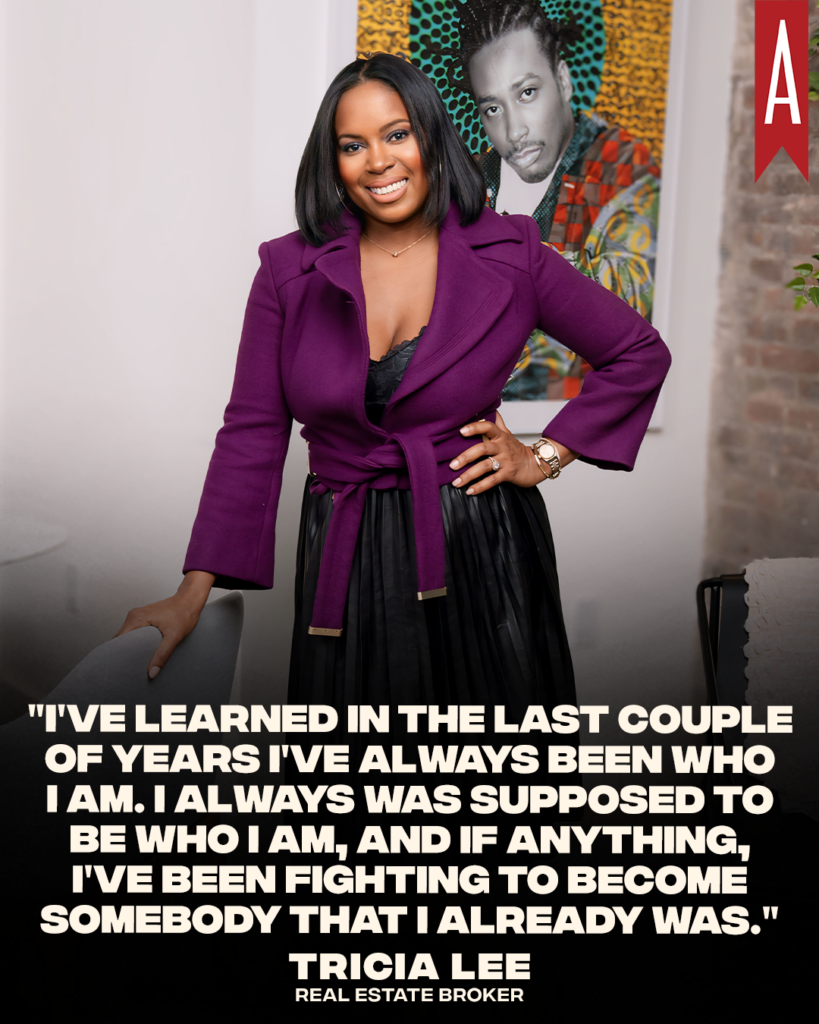
Her Agenda: You are one of the few Black real estate agents on the show, selling luxury properties in New York. And before that, you owned [two] luxury nail salon[s] in Brooklyn, Polish Bar. Why do you think it’s important for folks of color, especially Black folks, to see [themselves] flourishing in these luxurious spaces?
Tricia Lee: It’s imperative that we as a community believe that we deserve the best. A former agent of mine said that her mom always said, ‘Nothing but the best for Cynthia.’ And I was like, ‘Can I have that?’ And she’s like, ‘Yeah, you can, you can say it. Nothing but the best for T. Lee.’ I feel that with every fiber of my body because it’s how I move through my world. Some of my friends have said to me if luxury were a person in real life, it’d be [me]. I really believe in treating yourself well, doing your best, and demanding the best.
It’s just the way I am. I think because of my beauty background, or maybe my dance background as a child, I’m a very visual person. I mean, if I’m eating and we’re eating together, my plate’s not going to look like your plate. It’s going to be laid out beautifully. I’m going to wipe the stains off the side of the plate as if I’m in a restaurant because that’s how I treat myself. I treat the people that I love or the people that are in my life the same way. So, [with] my audience, I feel like I owe them that much too. I don’t feel that it should be unique or a minority point for us to be highlighted, live well, [and] for us to have amazing experiences. I want to show that to the world and show it to my community, but I want to do it in a very responsible way. I don’t want to go on a television show in front of the world with a bunch of borrowed clothes, free makeup, and free wigs and say that that’s me every day. Y’all are going to get this bad skin sometimes. My hair’s going to be sticking up sometimes. As glamorous as I can be, I also want to show what’s very real.
When I first moved to New York, I was 22 years old. I think about that version of myself and what influence someone like me would have on that mind. I take it really seriously because I don’t want to show a younger version of Tricia Lee or younger women that these unrealistic expectations are what’s truthful. So there’s a part of me with the show that was very intentional with things that I shared and things that I did because I don’t want to create crazy pressure for young Black women. They need to be more focused on their health, their happiness, a clear mind, good rest, living a good life, [and] being a good person. [You can focus on] looking good and presenting yourself in the world as strong and powerful, but not glossed in and shiny and fake. That’s not to shade anybody. I just feel like if I have a say, I’m going to be responsible for what I say, that’s all.
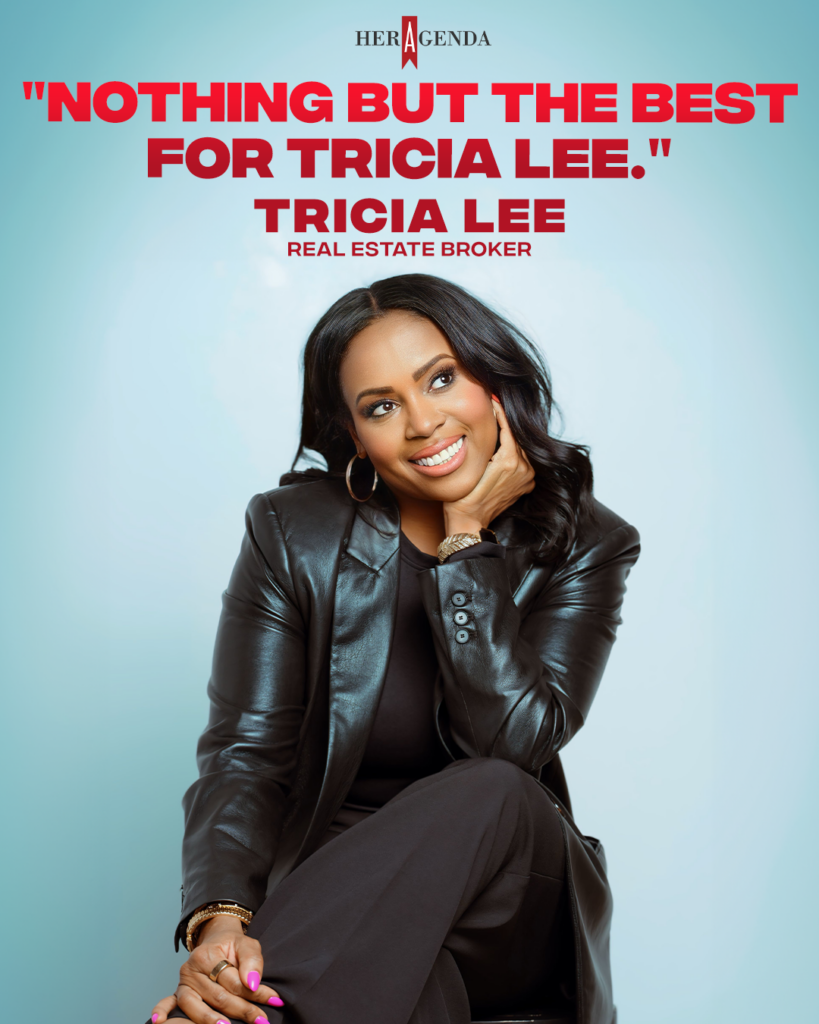
Her Agenda: Episode one, your nails, you had French tips. [Your] right hand was blue, [and your] left hand was pink.
Tricia Lee: Actually, the right hand is green, and the left hand is pink because I’m an AKA. I feel like my nails are an expression of who I am. A lot of times, my left hand will be orange [and] my right hand will be pink because the two colors I love the most on my fingers are pink and coral. I do a little nod to the AKAs by wearing my nails pink and green a lot because I do that in life, so why not do that on the show? There are times when I have beautiful red nails on, and that’s intentional because all of my really good friends are Deltas, and I’m shouting them out too. I used to get a lot of flack for coming from a beauty background into brokerage[.] People would be like, ‘Well, how do you expect to be successful? [This] world’s just so completely different.’ So, it’s important to me to reflect beauty in this new business and to go against the rail with that because I’m absolutely a beauty girl killing the game in real estate. I don’t want people to doubt that if you have a background in one thing, you can’t be really good at something else. It’s important that I lead with my beauty background, and I do that through the expression of my fashion [and] my makeup, specifically my nails.
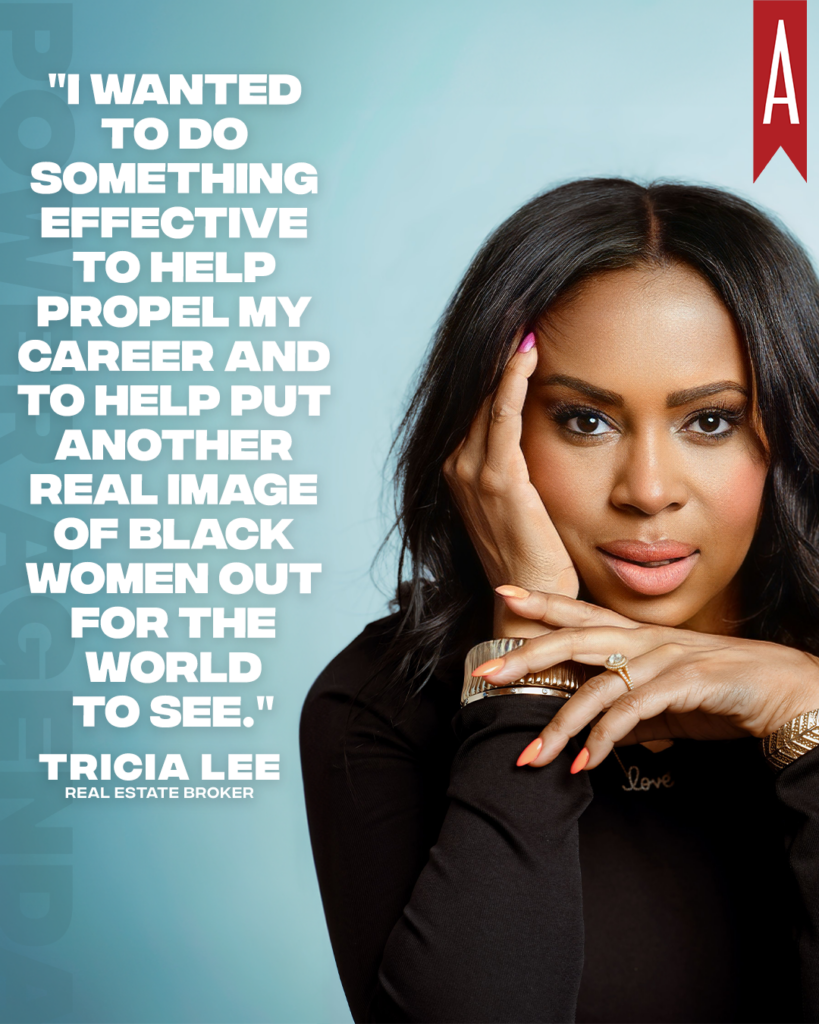
Her Agenda: You mentioned on the “Breakfast Club” that you didn’t see a dollar for the first six months of working [in real estate]. What kept you from not giving up and not falling back into [just] running your Polish Bar locations?
Tricia Lee: The landscape was really changing in the neighborhoods that I served. I [had] businesses in amazing neighborhoods where the real estate was performing extremely well. We had property owners in properties that were worth two and three times [more than] they had paid for it just a decade earlier. That impacted my business because the cultural neighborhood makeup changed. Those neighborhoods previously had been very artistic. They were where the editors, the writers, the beauty, [and] the fashion people [lived, and] a lot of my clients were fashion brand owners. As price points [changed] and the real estate started to perform really well, it directly impacted my business because those beauty-focused people [were] being priced out of the neighborhood. We were getting more tech [people] and founders.
Separately, I felt I had enough people around me who were in real estate that were giving me guidance. I’ve got a best friend who’s a very successful woman. [She’s] a Black woman developer. We’re best friends [and] best friends talk about work and dating life. I always kind of knew a lot about her work, the good and the bad parts, the challenges, and some of her strategy. I kind of was in front of the real estate thing for a while and I knew it wasn’t an overnight thing. Even me not making a dollar for six months is a tremendous time slot. I know people that didn’t make a dollar for two years. My six months is because I know everybody in Brooklyn, I was running two businesses, and I’m a really great marketer. I had phone numbers [and emails] to all of the flyest women in Brooklyn. I started ahead of the game.
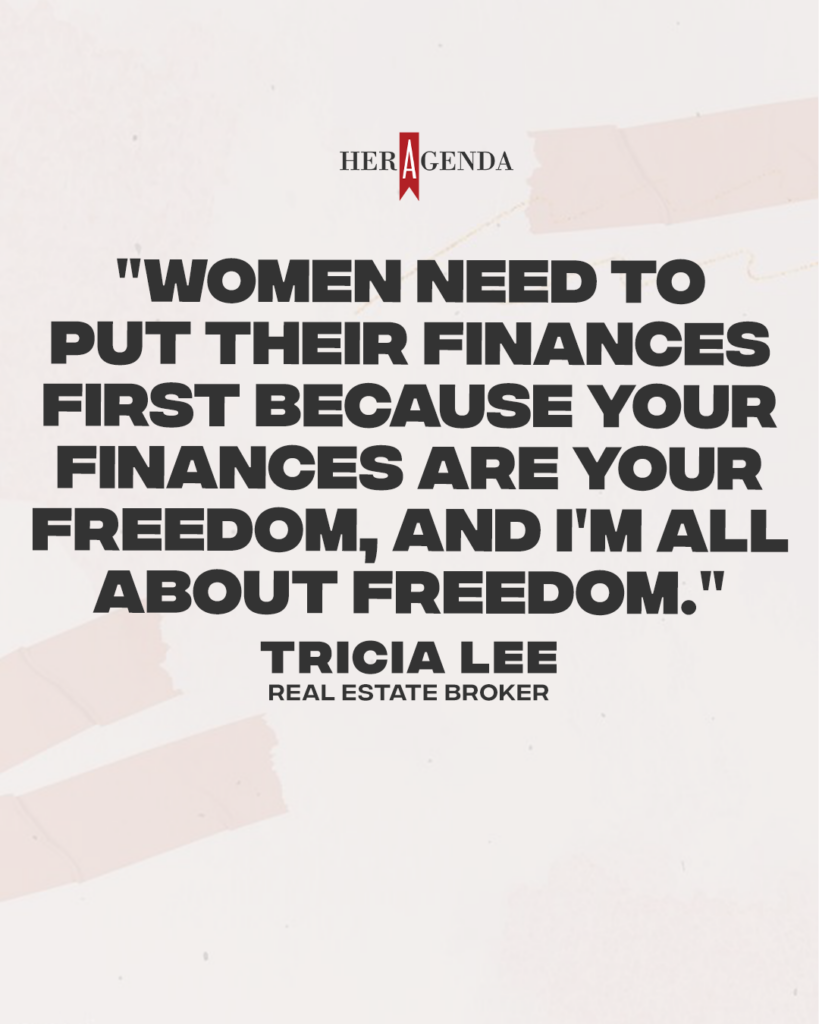
Her Agenda: On the show, Ryan [Serhant] coins you as the “Mayor of Brooklyn.” We see you dominate Brooklyn real estate, but you have a goal of moving into Manhattan real estate. In episode five, you advocate for yourself to Ryan. He gives you the Brooklyn Point development, and then you get your first listing in Manhattan. Watching it, [we’re] like, oh my gosh, she did it. She accomplished the goal right in front of us!
Tricia Lee: That’s my annual review you guys are seeing. When you’re in real estate, [it’s] not that everyone gets an annual review, but I insist on [one] because I want to review you just like I want you to review me. I’m partnered with Serhant, which means that I pay for services, and they provide services for me to propel my business. It’s a give-and-take relationship, but I cut the check. Brokers pay their brokerages out of their commissions, it’s not the other way around. Also, it’s important to say [that] Ryan doesn’t owe me or any other agent anything. We are there to learn and be mentored by this brand, this man, and what he’s done.
With Brooklyn Point, I was like, I need this experience, which is truthful. It’s very hard to delve into [a] new development if you’re in a resale business because [with] new developments, typically, you go into these buildings, and you only focus on those buildings. I don’t want that, I want everything. I had been selling at Brooklyn Point already [and] I was a huge fan of the building. [Ryan] knew I was a fan [and] he gave me an opportunity to pitch the developer[.] So, I go and pitch [Ari Goldstein], the most notorious developer in New York and probably Miami as well. Because I do well with that, then Ryan gives me the opportunity to work on a deal on a property with him in Manhattan. But those scenes are four months apart. I had to perform in order to get that second conversation going. That’s a lot of pressure while you’re running a business, filming a show, and you better sell your ass off too. There is no conversation about doing more unless you do really well with the things that you’re currently working on. You’re only as good as your last sale in this business.
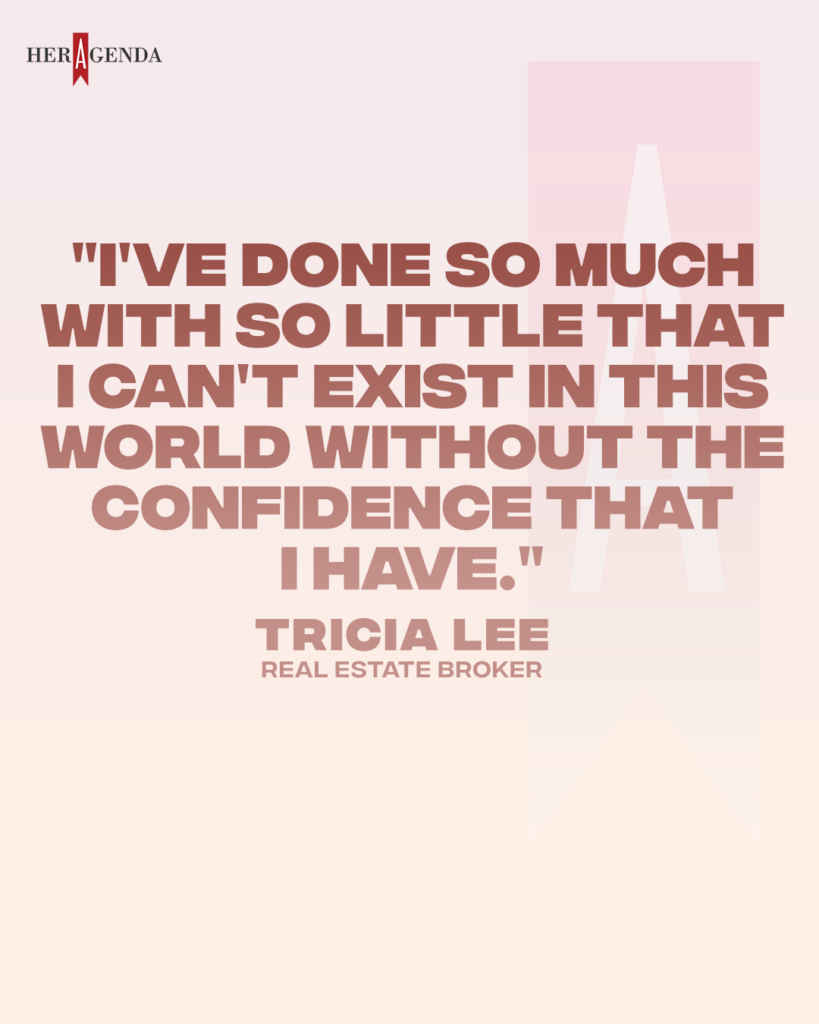
Her Agenda: You have a lot of confidence, drive, perseverance, grit, [and] tenacity. Where do you think that stems from?
Tricia Lee: I moved to New York over 20 years ago with not a dollar to my name [and] I had a lot of dreams. I’ve always seen really great things for my life. I’ve always thought ‘The best for Tricia Lee.’ That’s just my brand of living. I think I’m a very powerful person [and] I do think that that is DNA. There’s a lot of backstory with who my birth mother was, and she passed away when I was very young. I was raised by my step mom, which is who I always talk about. But, in the last couple of years, I learned a lot about my birth mother, and a lot of pieces of my life made sense to me. [She] was a badass who lived in Brooklyn. [She] ran businesses, had the same reputation that I have, and did a lot of the similar things that I did. I’ve learned in the last couple of years I’ve always been who I am. I always was supposed to be who I am, and if anything, I’ve been fighting to become somebody that I already was. I think the confidence and the power comes from [the fact that] I’ve built this life in New York with very little help and very little support. Not to say I haven’t had support because you do well and people want to see you do better, so [they] help you. But those people have been unrelated people. I’ve done so much with so little that I can’t exist in this world without the confidence that I have.
As Black women, when we show up anywhere in any space, we have to armor ourselves with a certain level of competence, confidence, and power. I have a very strong feeling that if I’m walking into the room, I’m going to walk into the room very powerfully because I think everything about our world tells me that I should not do that. I think that in order to function in this world and to win, you have to do it. You don’t have a choice. My confidence is rooted in my competence and my confidence is rooted in my capabilities, my receipts, and the things I’ve done. I stand in front of people as a woman who’s built a business from scratch with a huge client base, and it literally [has been] a household name in my community for a decade. That gives me the right to have the confidence that I have. I don’t care if I’m in real estate and I’ve been here for two days, I’m still gonna walk in here confidently because I know who I am, and I know what I’ve done.
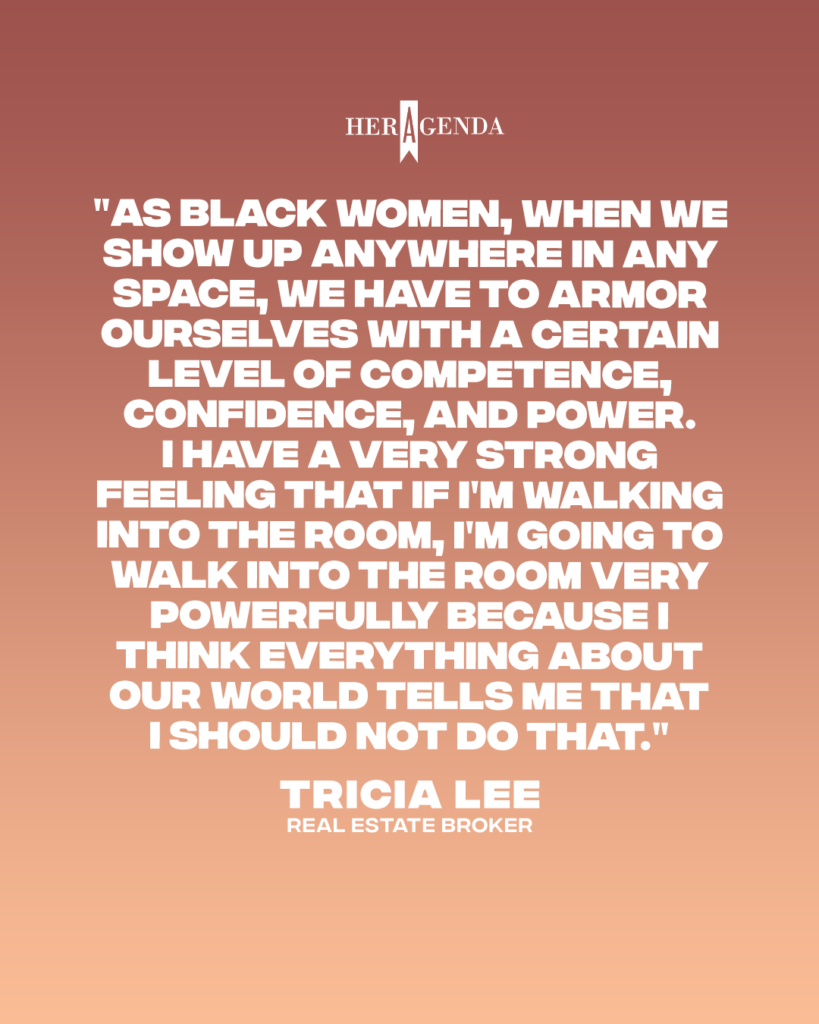
Her Agenda: [Let’s] shift gears a little bit. You [now] work with your partner, Jeffrey St. Arromand, [and you two met] when you were both transitioning into real estate. How do you balance tending to your relationship and tending to business, too?
Tricia Lee: It’s been very difficult because you have two people who have bad habits. There are certain boundaries, there are certain ground rules, and I think we do the best we can to respect those things, but it’s hard. I don’t think we have it figured out, I think we are figuring it out. As truthful and as authentic as I am with the work [and] with [my] image, I would want to be that way with the relationship as well. I’m not couple goals by any means. We will be in the middle of Morocco, and [we’re] like, ‘Until 10 am, you’re allowed to check emails, you’re allowed to check in with your clients, and then from that point on, the rest of the day is vacation.’ A lot of people may be like, no, actually, we’re on vacation, and that’s unacceptable. You know? But, we understand each other’s weight that we carry. We understand each other’s responsibility, and we give a little bit of grace to that. I think we both want a really good life, want a really healthy, happy relationship, I work with couples all the time, all different dynamics of couples, and I’m no better. We both have therapists. We both work on dealing with our own personal issues and how that shows up in the relationship. We have good, strong communication [and] I’m proud of that. We talk a lot about our relationship. For people who live together, shoot together, and work together, I don’t know how we talk so much. I don’t know how he [doesn’t] get sick and tired of listening to me. With all things relationship, I would never give that lie to people that everything’s perfect. We get on each other’s nerves. That’s what happens. But, we like each other, and we’re friends, and that’s great.
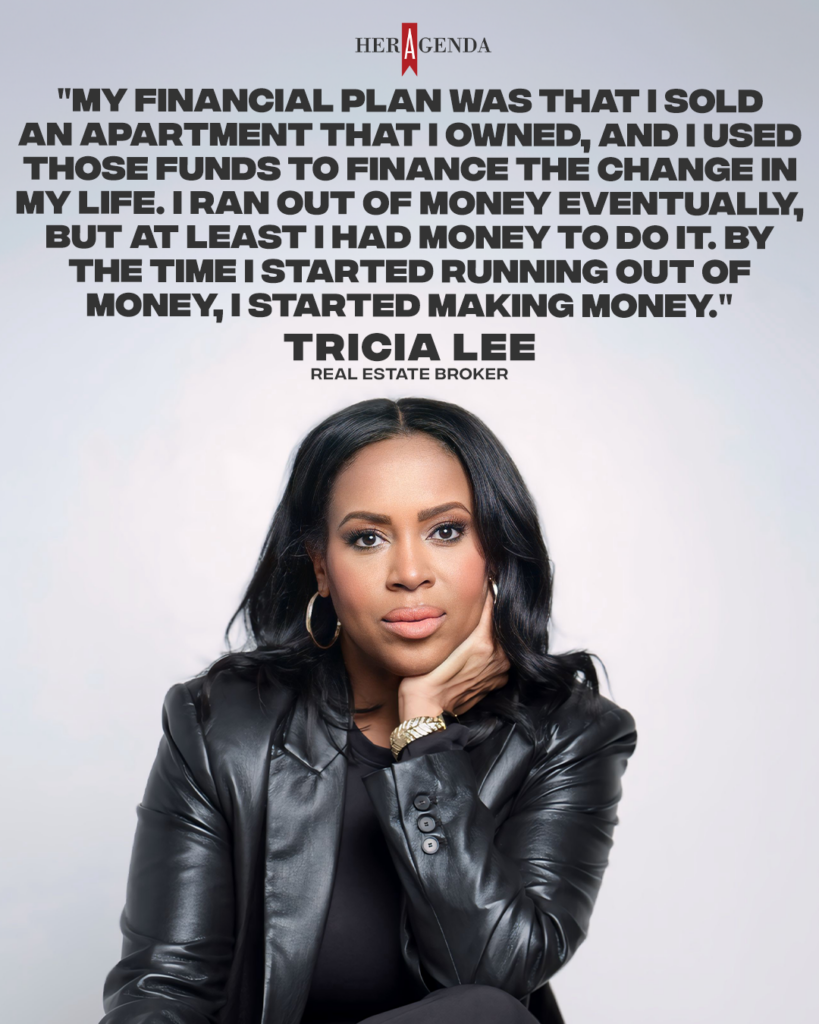
Her Agenda: What are other things that you really want to accomplish as you go along in your career in Brooklyn and New York City?
Tricia Lee: I would love to share more of my day in the life of what it is that I do with my work [and] with my life. I’m hoping that we’ll get a season two [of the show], and I’ll be able to share more of my days and my work, more of Brooklyn [and] more of Manhattan. I love Manhattan. I’m in Manhattan three or four days a week. I’m hoping to grow my business more in Manhattan. I got two new listings coming up [there], so I’m excited about that. Outside of that work, a lot of my interests lie in beauty, so I think that the next thing you’ll probably see from me will be some level of a beauty collaboration or a beauty product. I still very much am a beauty girl.
I [also] do a women’s financial wellness series called Money Matters with Tricia Lee [and] I’ve worked with Her Agenda on that multiple times. I’ll be putting together a women’s financial wellness event for the fall. Hopefully, I’ll be able to share it on the show, but even if I’m not, it’s a really well-attended event. I bring in all of my amazing financial experts. I’ve had [The] Budgetnista, I’ve had Her Agenda there. I’ve had Dawanna Williams, America’s biggest Black woman developer, incorporated into my events. That’s probably the next bullet point you all will see is Money Matters with Tricia Lee, where we’ll be talking [about] financial wellness, home ownership, and retirement planning. Women need to put their finances first because your finances are your freedom, and I’m all about freedom. I got a big ol’ red tattoo on my shoulder that says freedom. Money ain’t everything, but it’s freedom, and I want all of us to have it. Everybody that looks like me, I want y’all to have your freedom.
Her Agenda: For young women reading this, what advice would you have for [those] that may have that entrepreneurial spirit within them but are not quite sure how to access it yet?
Tricia Lee: Start reading about anything entrepreneurial-related. Whether it is the facets of putting a business together on a legal and a financial level, [or] learning about corporations, LLCs, accounting, bookkeeping, [and] the law around what it is that you do. It’s good because you’re going to expound upon your education, but you’re also going to get into the habit of that discipline of reading. You’re not going to run any business without constantly educating yourself on things because every industry is constantly changing. If you think you want to open a business, [get] close to that business and try to assess if it’s something that you would want to do every day. If people say, ‘Oh, I want to open a Pilates studio,’ do you want to be inside a Pilates studio every single day? Because that’s what that will look like for a while, at least until you get it off the ground. When I opened my nail bar, I was inside a nail bar every single day for 10 hours. So I would look at those things as well. Is the environment where you would be working, setting up, or creating, is that something that you would enjoy? I love beauty, so I can stand in front of a beauty business from morning until night, and it doesn’t impact me in any way. I don’t think I go a week without being inside of a Sephora to be honest with you. So, try to find yourself in an environment that you love because you’re going to spend a lot of time there trying to work out the kinks with that business. I think the third point I would [give] to any entrepreneur is to create a financial plan and how you’re going to go about your goals because nothing goes as planned. That could be from a real estate level, running a brick and mortar, to the cost of running your business, [or] the cost of employment. We saw a few years ago where [the] minimum wage went up by [a] very drastic number. That would have affected a lot of small businesses that went from paying people $8 an hour to $15 an hour. You’re not doubling your prices, but you have to double your wages. So, start to learn about those things because a lot of things can change.
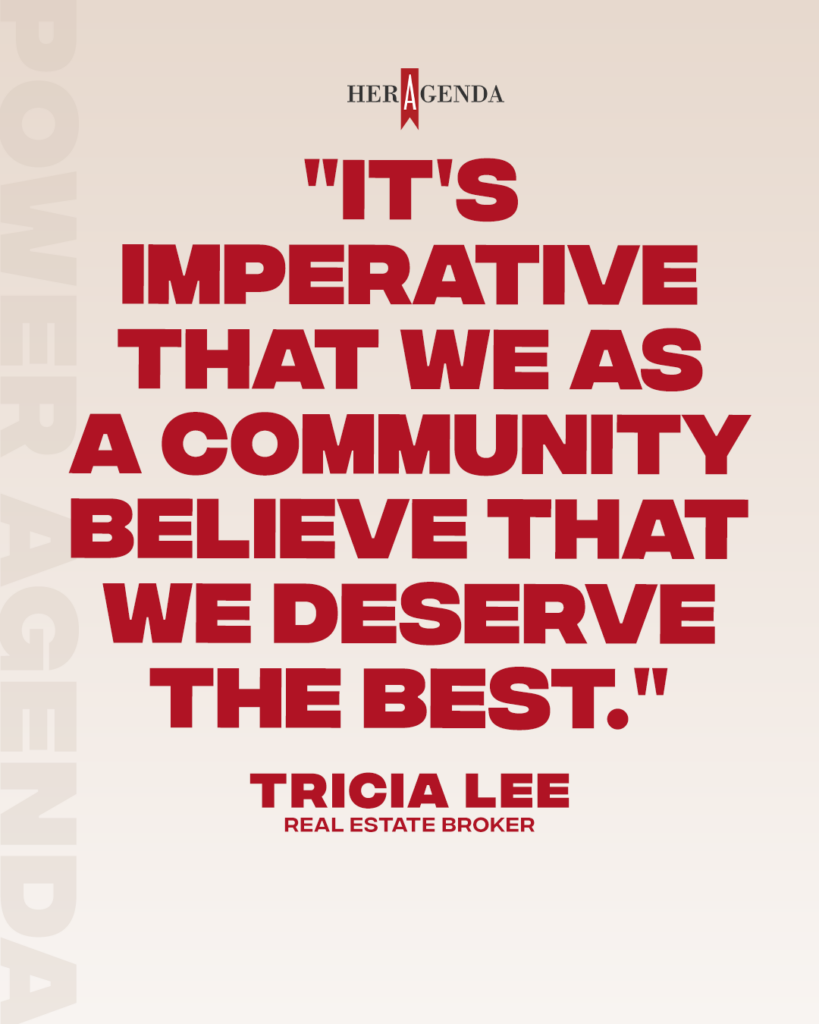
My financial plan was [that] I sold an apartment that I owned, and [I used] those funds to finance the change in my life. I ran out of money eventually, but at least I had money to do it. By the time I started running out of money, I started making money. It worked out because God will always provide a way, but I didn’t expect Him to provide a way. I had my own plan. So I would say studying the research as far as the industry itself. Research the environment that you would be required to [work] in all the time. And then [have] a financial plan. I opened Polish Bar with a set financial plan of how I was going to take care of myself, take care of my bills my expenses, and allow myself to work in a business that could possibly make no money for six months to a year, and I was still comfortable.
[Editor’s note: This interview has been edited for length and clarity.]



